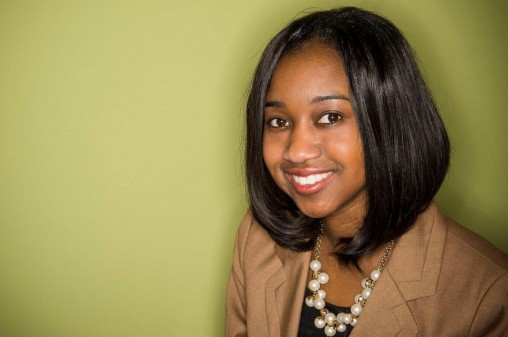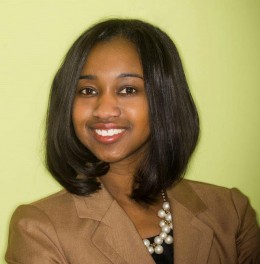
After participating in the Wright STEPP engineering-prep program and earning two biomedical engineering degrees at Wright State, Adrienne Bolds-Ephrem is excelling with an Air Force sensors unit.
Even as a young girl, she thought outside the box.
When Adrienne Ephrem was in second grade, she and her classmates were assigned to design something from a cardboard box and bring it to school the next day.
Most of the boys made cars. Most of the girls made dollhouses. Ephrem made a flat-screen TV that stole the show.
It featured a screen, a channel-turning knob and a tape recorder that played audio from the children’s television game show “Fun House.” It operated mechanically with gears, a rubber band and a cardboard tube from a roll of paper towels.
“My teacher just loved it,” Ephrem recalled. “She had other classes come in and I demonstrated it.”
Today, Bolds-Ephrem has turned that “outside-the-box” thinking into an engineering career with the Air Force. And she did it by way of the Wright STEPP engineering-prep program and by picking up two biomedical engineering degrees at Wright State University.
“The curriculum at Wright State is challenging, but it prepares you for what you are about to do career-wise. There are some schools whose programs are not as rigorous,” she said. “I feel like Wright State makes you work hard for the degree that you get.”
Ephrem is currently a bio-sensing engineer at Wright-Patterson Air Force Base, conducting basic research on emerging sensing technologies and materials. Sensors are devices that detect events or changes and put out electrical or optical signals. They can be used in anything from surveillance to bomb detection.
Ephrem grew up in Dayton, the daughter of a mother who works as a chemist at Navistar in Springfield and a father who works at Cargill in Dayton.
She was introduced to Wright State at age 7 when her mother brought her to one of her chemistry classes.

Adrienne Ephrem is currently a bio-sensing engineer at Wright-Patterson Air Force Base, conducting research on emerging sensing technologies and materials.
“I couldn’t wait to get to college after that,” she said.
Ephrem became interested in biology and science in elementary school. When she was in middle school, she was accepted into Wright STEPP, the university’s Science, Technology and Engineering Preparatory Program whose mission is to enhance the development and education of youth underrepresented in the fields of engineering, math and science.
“It’s a very special program,” she said, adding that most of the teachers are from Wright-Patterson. “There are a lot of students in the inner-city schools who may not even think about going to college. Wright STEPP shows you the possibilities.”
Ephrem is currently a youth pastor at Breakthrough Anointed Ministries Redemption Center and mentors a boy at Reclaiming Futures, which helps young people in trouble with drugs, alcohol and crime.
After graduating from Meadowdale High School in 1999, Ephrem enrolled at Wright State and studied biomedical engineering in the College of Engineering and Computer Science.
She once become so immersed in classes such as engineering statistics, thermodynamics, biomaterials and anatomy and physiology that she forgot to call home, prompting her mother to drive to campus and look for her. She received her bachelor’s degree in biomedical engineering in 2003 and her master’s the following year.
Ephrem received a Wright STEPP scholarship that paid full tuition for four years. In 2004, she was named the Most Outstanding Student at the graduate level.
Three of Ephrem’s siblings and two of her cousins attended the Wright STEPP program. All of them graduated from Wright State with engineering and chemistry degrees.
Wright State is engaged in a $150 million fundraising campaign that promises to further elevate the school’s prominence by expanding scholarships, attracting more top-flight faculty and supporting construction of state-of-the-art facilities. Led by Academy Award-winning actor Tom Hanks and Amanda Wright Lane, great grandniece of university namesakes Wilbur and Orville Wright, the campaign has raised more than $110 million so far.
Ephrem’s job at Wright-Patterson involved a twist of fate.
When she was in graduate school, she attended a job fair in Dallas sponsored by the National Society of Black Engineers. On the final day and in the final hour, she had just about given up on finding a job when she spotted a booth manned by officials from Wright-Patterson’s Air Force Research Laboratory.
And, yes, they just happened to have an opening for a qualified biomedical engineer. Two days after graduation, Ephrem had a job with the Air Force.
Ephrem loves her work and wants to make her career within the Department of Defense.
“The toughest part of the job is knowing that the technology you have can make a difference, can save lives, and just trying to get it through each and every developmental step,” she said. “Once you are able to get the technology transitioned, that’s the rewarding part.”

 Wright State Police Department delivers major donation to Raider Food Pantry
Wright State Police Department delivers major donation to Raider Food Pantry  Wright State engineering and computer science students earn prestigious federal SMART Scholarships
Wright State engineering and computer science students earn prestigious federal SMART Scholarships  Wright State Police Chief Kurt Holden selected for prestigious FBI National Academy program
Wright State Police Chief Kurt Holden selected for prestigious FBI National Academy program  Wright State’s Raj Soin College of Business ranked among the best for entrepreneurs by Princeton Review
Wright State’s Raj Soin College of Business ranked among the best for entrepreneurs by Princeton Review  Wright State’s annual Raidersgiving draws hundreds
Wright State’s annual Raidersgiving draws hundreds 